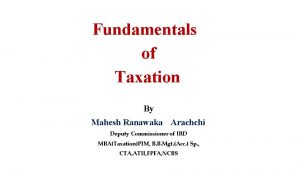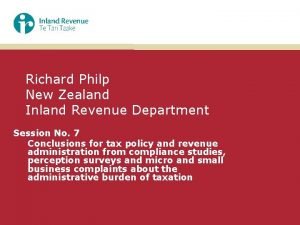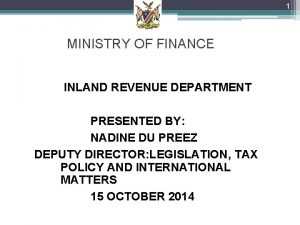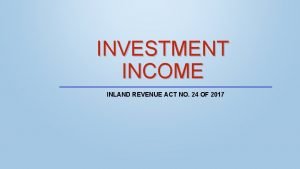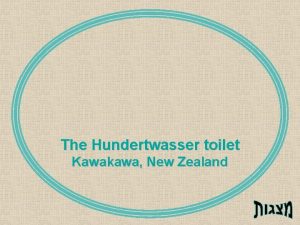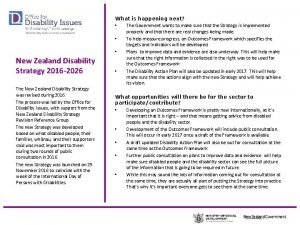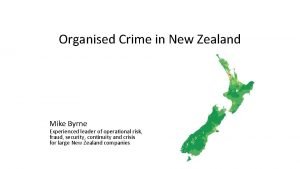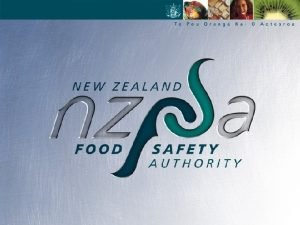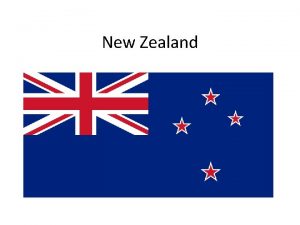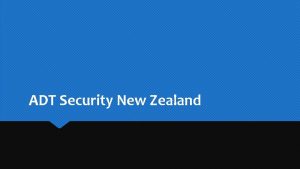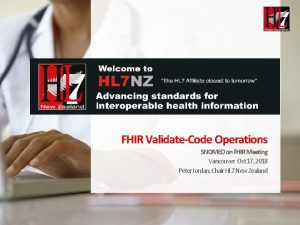Richard Philp New Zealand Inland Revenue Department Session


















- Slides: 18

Richard Philp New Zealand Inland Revenue Department Session No. 7 Conclusions for tax policy and revenue administration from compliance studies, perception surveys and micro and small business complaints about the administrative burden of taxation

PERCEPTIONS OF TAX AGENTS & SME BUSINESSES FOLLOWING AN AUDIT

MEASURING OUR EFFECTIVENESS TAX AGENTS: Ø To obtain their views of the audit experience to assist Inland Revenue [IR] in making business planning decisions and areas where we can improve performance of the audit function. Ø provide IR with information to respond to stakeholder and media questions and commentary about the process of audit. SMALL AND MEDIUM BUSINESS Ø The primary objectives are to measure: – businesses’ understanding and expectations of audits – overall perceptions of the audit experience – perceptions of specific elements of the audit process – businesses’ suggestions for improvement – likely effect of the audit on future behaviour.

TAX AGENTS SURVEY Ø First survey of tax agents Ø TWO PHASED APPROACH: 1. QUALITATIVE exploratory In Depth interviews with 15 tax agents to explore a range of perspectives where they believe the audit process could be improved. 2. QUANTITATIVE survey of 300 tax agents using a structured questionnaire from the Qualitative interviews. Ø 70% members of NZICA Ø Margin of error +/- 5. 7%

SME SURVEY Ø 6 TH Survey Ø 300 interviews conducted by telephone in June 2009 ØMargin of error +/- 5. 6%

KEY FINDINGS TAX AGENTS SURVEY Ø Tax Agents generally have divided opinions about (a) their perceptions of the audit process and (b) IR’s overall performance. Ø The results point to some tensions in tax agents’ views between seeing their role as helping to reduce clients’ tax and increase their wealth, and assisting clients to become more tax compliant.

OVERALL PERCEPTIONS OF THE AUDIT PROCESS (TAX AGENTS)



COMPLIANCE AND PENALTIES

COMPLIANCE AND PENALTIES

IN SUMMARY TAX AGENTS ARE; GENERALLY POSITIVE ABOUT GENERALLY NEGATIVE ABOUT ØInvestigators taking a pragmatic approach throughout the audit Ø Investigators recognising the implications of any delays in the audit for tax agents’ clients ØTax agents’ queries and requests for information during the audit being answered in a timely manner ØKeeping tax agents informed about whether they have provided Inland Revenue with all the information they required ØThroughout the audit keeping tax agents well informed of any tax issues found ØGiving sufficient explanation of the reasons for the audit outcomes. ØInvestigators showing greater consideration and understanding of clients business environment and impact of delays ØReducing uncertainties, frustrations and anxieties created by being audited ØBeing more informative about the processes involved ØImproving the timeliness of communication with respect to progress of the audit ØReducing the time involved in being audited ØConveying positive aspects associated with being audited by advising clients about ways in which they can improve their future tax compliance ØDemonstrating the fairness, reasonableness and consistency in application of penalties and compliance costs.

KEY FINDINGS SME SURVEY OVERALL PERCEPTIONS – 70% of respondents view the audit experience favourably in the 2009 survey, similar to 2008. – 72% of respondents agree the audit was ‘handled well’ by Inland Revenue, compared to 71% in 2008 – 75% agree the audit was ‘conducted in a reasonable manner’ compared to 80% in 2008. – Small decline in perception the audit experience helped SME’s become more tax compliant.

SME RATINGS AREAS WHERE RATINGS IMPROVED AREAS WHERE RATINGS DECLINED ØInvestigators; - being courteous - was easy to contact - did things when they said they would - clear and easy to understand communication ØCommunication and timeliness; - written communication clear and easy to understand - audit scope and process clearly explained - given sufficient explanation of reasons for audit outcomes - those businesses who had more tax to pay had IR’s expectations around payment explained. ØLength of audit was reasonable ØInformed about the disputes process ØAudit ‘handled well’ by IR, and ‘conducted in a reasonable manner’ significantly less strongly agree. ØWas helpful in meeting future tax obligations. ØKept well informed on audit progress and tax issues.

RESULT OF THE AUDIT SME SURVEY Ø 73% of businesses said the Investigator explained IR’s expectation around payment of additional tax which is similar to last year. Ø 53% of businesses received a written explanation of the proposed tax adjustment whilst 12% did not. 32% said no adjustment was made. Ø 51% of businesses who received a proposed tax adjustment said they were informed about the disputes process if they disagreed.

THEMES IDENTIFIED FROM BOTH SURVEY’S POSITIVES NEGATIVES Investigators did well in; - being courteous - was easy to contact - did things when they said they would - clear and easy to understand communication Communication and timeliness; - written communication clear and easy to understand - audit scope and process clearly explained - kept well informed on audit progress and tax issues. - given sufficient explanation of reasons for audit outcomes Helpful in meeting future tax obligations; - audit helps to educate in tax obligations. (Tax Agents survey only) Investigators could improve in; - being well prepared for meetings - make them feel they know what they are talking about - Commercial awareness – need to improve on Tax Agents expectations. - had authority to make decisions Communication and timeliness; - audit gave greater understanding of tax obligations - kept well informed about when the audit would be completed. - Audit completed in reasonable timeframe - IR takes a constructive open approach to audits Helpful in meeting future tax obligations; - audit gave greater understanding of tax obligations (SME survey only)

INITIATIVES TO ADDRESS THE FINDINGS: Ø Clear communication and discussion of the key findings of these surveys with Investigations managers, especially team leaders and investigators plus associated business areas who contribute to the audit process. Ø Reinforcing the responsibilities and accountabilities expected of investigations at all levels. Ø Increased monitoring of audit timeliness and use of a Case Director role for selected cases where independent guidance and resolution is required. Ø Review relevant best practice statements to increase certainty for customers and ensuring practice integrity. Key examples include: customer contact and relationship practices; increased transparency with the customer around risks identified that lead to an audit; and the timeliness of referrals between investigations and other internal units who support the audit process, eg Legal & Technical Services. Ø Deploy use of e-mail as a communication channel [previously not an option] especially with tax agents [as well as taxpayers] during an audit - support this with clear operating practices. Ø Continue to improve the “commercial awareness” of investigators via: – – knowledge sharing forums use recently appointed staff with specialist/extensive external commercial experience to share insights and knowledge on topical issues.

CONCLUSION
 Principles of taxation
Principles of taxation Richard philp
Richard philp Ministry of finance inland revenue
Ministry of finance inland revenue Inland revenue act no 24 of 2017
Inland revenue act no 24 of 2017 Kawakawa toilets
Kawakawa toilets New zealand official languages english
New zealand official languages english New zealand disability strategy
New zealand disability strategy When was new zealand discovered
When was new zealand discovered Australian vs new zealand accent
Australian vs new zealand accent Lesson 1: an introduction to oceania
Lesson 1: an introduction to oceania Alpha lipid lifeline nz
Alpha lipid lifeline nz New zealand hotspot
New zealand hotspot Aotearoa the land of the long white cloud
Aotearoa the land of the long white cloud The capital of new zealand
The capital of new zealand Natives of new zealand
Natives of new zealand Urfolk new zealand
Urfolk new zealand Slidetodoc.com
Slidetodoc.com New zealand health strategy 2016
New zealand health strategy 2016 New zealand holiday 2016
New zealand holiday 2016
